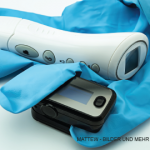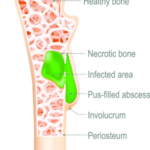PFAPA syndrome is an AID typically seen in children, and it is characterized by recurrent episodes of fever as well as painful aphthous ulcers, pharyngitis and/or cervical lymphadenopathy. Episodes last three to six days, and occur like clockwork every three to six weeks. Patients and their parents are often able to predict the next febrile flare on the calendar. They are asymptomatic between episodes. The diagnosis is primarily clinical. Steroids are effective in aborting acute episodes, but for patients with frequent or severe episodes, tonsillectomy has been shown to be curative in many cases.2
Dr. Broderick and colleagues wondered how many referrals were true PFAPA patients, and how many were just being labeled as such. “Most of the patients weren’t meeting Marshall’s criteria for PFAPA at all,” she explained. “So we used this as an opportunity to change our approach to recurrent fevers in our clinic. In the pediatric population, fevers are common, so we also wanted to find a way to reassure parents, especially during the pandemic, that not every fever is bad, but is an important aspect of the immune response.”
Dr. Broderick and her team took a close look at patients referred to their clinic for recurrent fevers. Ultimately, they found that the majority of patients either had recurrent infections or a variant of a known monogenic disorder. Some had allergies, PFAPA or diagnoses that weren’t monogenic AIDs at all (e.g., recurrent aphthous stomatitis, inflammatory bowel disease or leukemia).3 But what about the patients that just didn’t fit anywhere?
“That’s where the idea of SURF comes in,” said Dr. Broderick. “About 70–80% of patients with systemic autoinflammatory diseases fail to obtain a molecular diagnosis and most get tossed into the PFAPA category. We are trying to be clear about who is PFAPA and who isn’t, so we can optimize therapy. SURF patients are a large population that is distinct from PFAPA syndrome.” Of note, this name, coined by rheumatologist Karyl Barron, MD, seemed most appropriate because she and her colleagues are all San Diego surfers.
Evaluation & Management of SURF
Now that SURF has been described, we can start to talk about treatment. Marco Gattorno, MD, head, Unit of Rheumatology and Autoinflammatory Diseases, Istituto di Ricovero e Cura Pediatrico a Carattere Scientifico (IRCCS) Istituto G. Gaslini, Genoa, Italy, shared updates in this regard.
Dr. Gattorno and colleagues have been following a longitudinal cohort of these patients at his institution to better understand and treat children living with SURF.4,5 “SURF is a subset of patients with recurrent fever after careful exclusion of hereditary risk factors and PFAPA,” he said. “These patients seem to have homogenous clinical features and response to treatment.” Data show that the most common features among SURF patients include fever, arthralgias, abdominal pain and myalgia.



